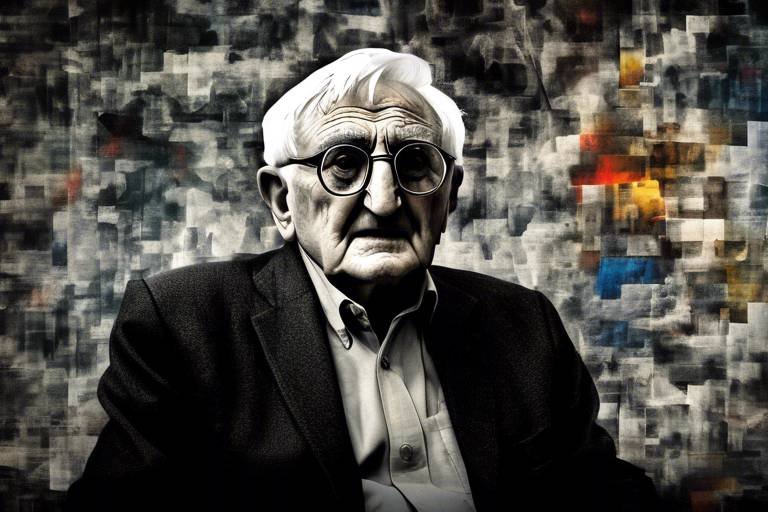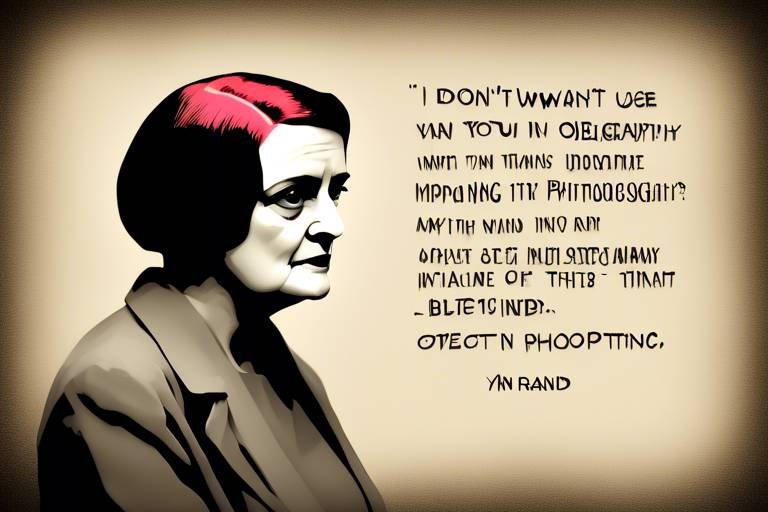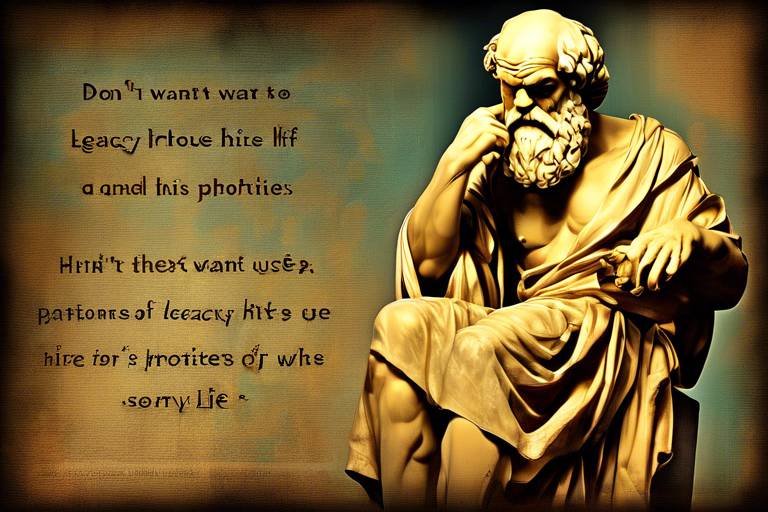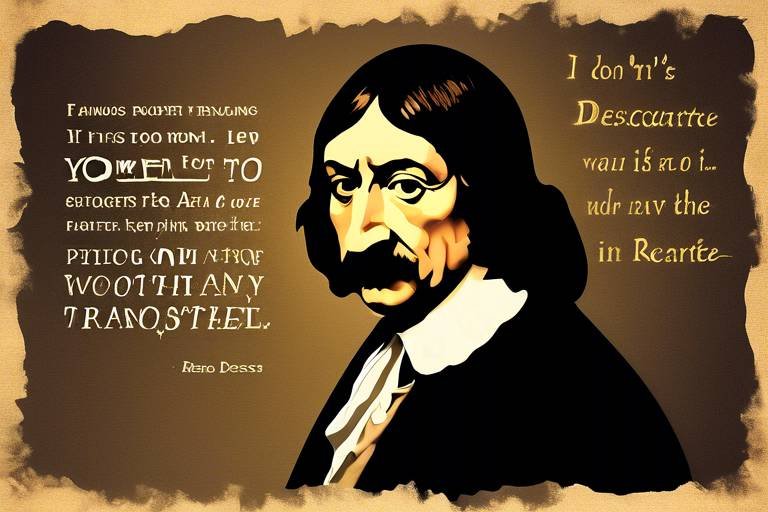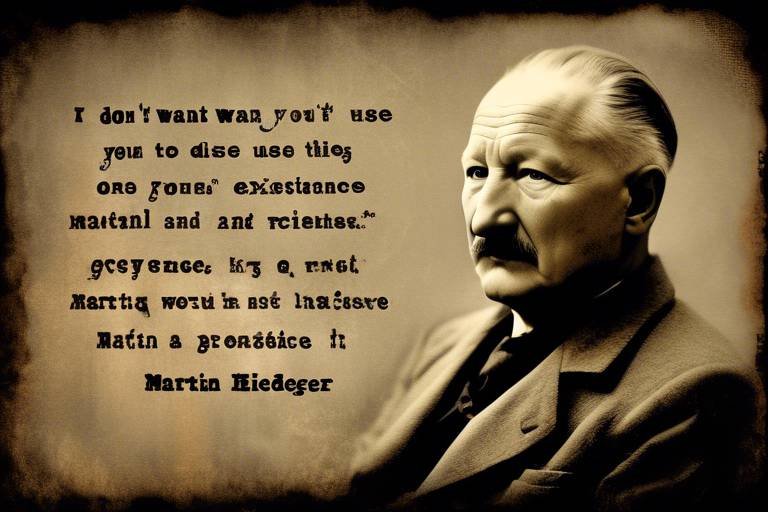Contributions of Paul-Michel Foucault to Post-structuralism
Paul-Michel Foucault, a towering figure in contemporary philosophy, has made profound contributions to the field of post-structuralism, reshaping our understanding of power, knowledge, and identity. His theories challenge traditional narratives and encourage us to rethink the structures that govern our lives. Foucault’s work invites us to consider how power operates not merely through institutions but also through everyday practices and discourses. By examining the interplay between knowledge and power, he provides a lens through which we can analyze the complexities of social relations and subjectivity. This article delves into the significant impact of Foucault's theories on post-structuralism, highlighting his key concepts, methodologies, and the broader implications of his work in contemporary philosophy and social theory.
Understanding the historical backdrop against which Foucault developed his ideas is crucial for appreciating his contributions to post-structuralism. Emerging in the mid-20th century, Foucault's work arose during a time of significant social upheaval and intellectual transformation. The aftermath of World War II, the rise of existentialism, and the questioning of Enlightenment ideals created fertile ground for his ideas. Foucault challenged established norms and narratives, urging us to critically examine the assumptions that underpin our understanding of truth, knowledge, and power. His work resonates with the broader currents of thought that sought to deconstruct traditional philosophies and reveal the contingent nature of social structures.
Foucault introduced several foundational concepts that reshaped the landscape of post-structuralist thought. Among these are power/knowledge, discourse, and biopolitics. These ideas are not just theoretical abstractions; they have practical implications across various academic disciplines. Foucault’s assertion that knowledge is intertwined with power challenges the notion of objective truth, suggesting that what we consider knowledge is often a product of social and historical contexts. This perspective invites scholars to rethink how knowledge is produced and disseminated, emphasizing the role of discourse in shaping our understanding of reality.
At the heart of Foucault's philosophy is the notion of power/knowledge. He argues that power is not merely repressive but also productive, shaping what is accepted as knowledge within society. This intricate relationship highlights how societal norms and individual subjectivities are constructed through power dynamics. Foucault’s analysis encourages us to ask questions like: How do institutions influence our understanding of truth? In what ways do societal norms shape our identities? By exploring these questions, we can uncover the underlying mechanisms that govern our lives.
Foucault's analysis of disciplinary power reveals how institutions regulate behavior through surveillance and normalization. This concept is particularly relevant in contemporary discussions about privacy and state control. Schools, prisons, and hospitals serve as examples of institutions that exert power over individuals, shaping their actions and beliefs. The pervasive nature of surveillance in modern society raises critical questions about individual autonomy and the implications of living under constant observation. Foucault compels us to consider how these disciplinary mechanisms affect our sense of self and our interactions with others.
While Foucault emphasizes the pervasive nature of power, he also explores the potential for resistance. He argues that power is not monolithic; rather, it is dispersed and can be challenged from various angles. This insight opens up possibilities for agency, suggesting that individuals are not merely passive subjects of power but can actively engage in subverting dominant discourses. Foucault’s ideas encourage us to recognize the spaces of resistance within societal structures, prompting us to consider how we can challenge the status quo and advocate for change.
Foucault’s exploration of discourse highlights how language and social practices construct identities and subjectivities. He posits that our understanding of ourselves is not fixed but is continually shaped by the discourses that surround us. This perspective emphasizes the fluidity and complexity of human experience, urging us to reconsider how we define ourselves and others. In a world where identities are often categorized and constrained, Foucault’s insights remind us of the power of language in shaping our perceptions and relationships.
The impact of Foucault's ideas extends far beyond philosophy, profoundly influencing various fields, including sociology, political science, and cultural studies. His work has prompted a reevaluation of traditional methodologies, advocating for a more nuanced understanding of social phenomena through the lens of discourse and power relations. This shift has encouraged scholars to explore the intricate connections between knowledge, power, and identity, fostering interdisciplinary dialogue and collaboration.
Sociologists, inspired by Foucault's theories, have begun to rethink their approaches to studying social phenomena. By incorporating Foucault's ideas, they advocate for a deeper understanding of how power dynamics shape social structures and individual experiences. This new perspective encourages researchers to explore the ways in which societal norms are constructed and contested, leading to richer analyses of social behavior and identity.
Foucault's insights into governmentality and biopolitics have reshaped political theory, encouraging a critical examination of state power and its implications for individual freedoms. His work challenges us to consider how governmental practices influence our lives, from healthcare policies to surveillance measures. By interrogating the relationship between power and governance, Foucault’s theories invite us to reflect on the responsibilities of both individuals and institutions in promoting social justice.
Despite his influence, Foucault's theories have faced critiques regarding their perceived relativism and ambiguity. Some scholars argue that his emphasis on the fluidity of truth and morality may lead to ethical relativism, complicating the establishment of universal principles. This critique raises important questions about the applicability of Foucault’s ideas in practical contexts. Furthermore, his use of complex terminology can create ambiguity, making it challenging for scholars to apply his theories consistently across different disciplines.
Critics contend that Foucault's approach may undermine the possibility of establishing a coherent ethical framework. By suggesting that truth and morality are contingent upon historical and social contexts, Foucault risks promoting a form of ethical relativism that complicates efforts to advocate for universal human rights. This debate invites ongoing reflection on the role of ethics in the context of power and knowledge.
Foucault's use of complex and often ambiguous terminology can create challenges for scholars attempting to apply his theories. The intricacies of his language may lead to misunderstandings or misinterpretations, hindering the practical application of his ideas across various contexts. This critique highlights the need for clarity in theoretical discussions while also acknowledging the richness of Foucault's insights.
Foucault's contributions remain influential in contemporary debates, with his ideas continuing to inspire scholars and activists engaged in discussions about power, identity, and social justice. His work challenges us to critically engage with the structures that shape our lives, encouraging a deeper understanding of the complexities of human experience.
Modern philosophers build upon Foucault's work to address current issues related to identity politics, surveillance, and the role of knowledge in shaping societal norms. His insights provide a framework for analyzing contemporary challenges, prompting us to consider how power operates in our digital age and the implications for individual autonomy and social justice.
Foucault's theories have also informed social movements, encouraging activists to critically engage with power structures and advocate for marginalized voices in society. By understanding how power operates at multiple levels, activists can develop strategies to challenge oppression and promote social change. Foucault’s legacy lives on in the ongoing struggles for justice and equality, reminding us of the importance of questioning the status quo.
- What is post-structuralism? Post-structuralism is a theoretical approach that critiques the idea of fixed meanings and emphasizes the role of language and power in shaping our understanding of reality.
- How did Foucault influence sociology? Foucault's theories encouraged sociologists to reconsider traditional methodologies and explore the connections between power, knowledge, and social structures.
- What are some critiques of Foucault's work? Critics argue that Foucault's emphasis on relativism complicates ethical discussions and that his complex terminology can create ambiguity in applying his theories.

Historical Context of Foucault's Work
To truly grasp the significance of Paul-Michel Foucault's contributions to post-structuralism, it's essential to understand the historical context in which he developed his theories. Born in 1926 in Poitiers, France, Foucault's intellectual journey unfolded against the backdrop of a world grappling with the aftermath of World War II, the rise of existentialism, and the burgeoning field of structuralism. These movements were pivotal in shaping his thoughts and provided fertile ground for his critiques of established norms.
During the mid-20th century, Europe was undergoing profound transformations. The horrors of the war had left a mark on the collective psyche, prompting many thinkers to question the very foundations of knowledge, power, and morality. In this milieu, Foucault emerged as a radical voice, challenging the dominant narratives that had long been taken for granted. His work can be seen as a response to the existentialist emphasis on individual freedom and the structuralist focus on underlying systems that govern human behavior.
Foucault's early career was influenced by the intellectual currents of French philosophy, particularly the works of philosophers like Jean-Paul Sartre and Simone de Beauvoir. However, he soon diverged from their existentialist ideas, opting instead to explore the interplay between knowledge and power. This shift marked the beginning of his inquiry into how societal institutions—such as prisons, hospitals, and schools—shape individual identities and behaviors.
Moreover, Foucault's engagement with historical materialism and the German idealism of thinkers like Georg Wilhelm Friedrich Hegel also played a crucial role in his development. He sought to uncover the historical contingencies that underlie contemporary social practices, emphasizing that knowledge is not static but is instead a product of specific historical conditions. His seminal works, such as Madness and Civilization and The Birth of the Clinic, illustrate this approach by tracing the evolution of societal attitudes towards madness and health.
In the 1960s and 1970s, Foucault's ideas gained traction as he began to articulate a more comprehensive critique of modernity. His concept of biopolitics emerged as a response to the ways in which state power governs not just through law but through the regulation of life itself. This was particularly relevant during a time when Western societies were increasingly concerned with issues of governance, surveillance, and the management of populations.
Foucault's work also coincided with the rise of postmodernism, a movement that questioned the grand narratives and universal truths that had dominated Western thought. In this context, Foucault's emphasis on the fluidity of meaning and the constructed nature of identities resonated with many contemporary theorists. His rejection of absolute truths and his focus on the local and specific allowed for a more nuanced understanding of power dynamics and social relations.
Ultimately, Foucault's historical context reveals a thinker deeply engaged with the pressing issues of his time. His ability to interrogate the connections between knowledge, power, and societal norms has left an indelible mark on post-structuralist thought and continues to inspire scholars across various disciplines today. By situating his work within the broader historical narrative, we can appreciate the revolutionary nature of his ideas and their lasting impact on contemporary philosophy and social theory.

Key Concepts in Foucault's Philosophy
Paul-Michel Foucault’s philosophy is a labyrinth of ideas that has significantly reshaped the landscape of post-structuralist thought. At the heart of his work are several key concepts that challenge traditional views on knowledge, power, and society. One of the most compelling aspects of Foucault's theories is how they intertwine and build upon each other, creating a rich tapestry of understanding that goes beyond mere academic discourse. His ideas compel us to rethink our assumptions about authority, identity, and the very fabric of social norms.
One of the foundational concepts introduced by Foucault is the idea of power/knowledge. This concept posits that power and knowledge are not separate entities but are deeply interlinked. In essence, knowledge is a product of power, and power is exercised through the production of knowledge. This relationship is crucial for understanding how societal norms are established and maintained. For instance, consider how educational institutions shape what is deemed 'knowledge' and, consequently, influence who gets to wield power in society. This dynamic raises important questions: Who decides what knowledge is valuable? How does this impact individual identities and societal structures?
Foucault's exploration of power and knowledge goes further to examine how societal norms are constructed through various institutions, such as schools, prisons, and hospitals. He argues that these institutions do not just serve to govern behavior but also play a crucial role in defining what is considered 'normal' or 'acceptable.' This leads to a form of social control that is often subtle yet pervasive. For example, the normalization of certain behaviors can marginalize those who do not conform, creating a stratified society where power dynamics are continuously at play.
Another vital concept in Foucault's philosophy is disciplinary power. This type of power operates through surveillance, regulation, and normalization. Foucault famously illustrated this through the metaphor of the Panopticon, a theoretical prison design where inmates are constantly observed by a central watchtower, even if they cannot see the watchman. This constant surveillance leads individuals to regulate their own behavior, thus internalizing the power structure. In our modern context, think about how social media platforms operate in a similar fashion, where users self-censor based on perceived societal norms and expectations.
However, Foucault also offers a glimmer of hope through his concept of resistance. He suggests that power is not monolithic; it is everywhere and can be challenged from various angles. This idea introduces the notion of agency, where individuals and groups can resist dominant discourses and create alternative narratives. For instance, social movements advocating for LGBTQ+ rights or racial equality exemplify how marginalized voices can disrupt established power structures. This interplay between power and resistance is essential for understanding how change occurs within society.
Foucault’s analysis of discourse further emphasizes the fluidity of identities and subjectivities. He argues that language and social practices are not merely tools for communication but are instrumental in constructing our identities. Discourse shapes how we perceive ourselves and others, leading to a complex understanding of human experience. For example, the way mental health is discussed in society can significantly influence individuals' self-perceptions and societal attitudes towards them. This highlights the importance of critically examining the language we use and the narratives we accept.
In summary, Foucault's key concepts—power/knowledge, disciplinary power, resistance, and discourse—offer profound insights into the mechanics of society. They challenge us to question our assumptions and engage with the world in a more nuanced way. By understanding these concepts, we can begin to unravel the intricate web of power that influences our lives and the lives of those around us.
- What is Foucault's main contribution to philosophy? Foucault's main contribution lies in his analysis of the relationship between power and knowledge, and how this relationship shapes societal norms and individual identities.
- How does Foucault define power? Foucault defines power as a complex network of relationships that is exercised rather than possessed, emphasizing that it is everywhere and can be challenged.
- What is the significance of discourse in Foucault's work? Discourse is significant because it shapes our understanding of reality, influencing how identities are constructed and how social practices are enacted.
- Can Foucault's theories be applied to contemporary issues? Yes, Foucault's theories remain relevant today, particularly in discussions about surveillance, identity politics, and social justice movements.

Power and Knowledge
Foucault's notion of power/knowledge is a groundbreaking concept that reshapes our understanding of how power operates within society. Rather than viewing power as a mere top-down force, Foucault argues that power is intricately linked to knowledge production. This relationship suggests that knowledge is not just a neutral tool but is deeply embedded within power structures. In simpler terms, knowledge is a form of power, and power produces knowledge. This dynamic means that what we consider to be 'truth' is often a reflection of the prevailing power relations at play.
To illustrate this idea, consider the way certain narratives dominate public discourse. For instance, the portrayal of mental illness has evolved over time, influenced by both societal attitudes and the medical community's understanding. Foucault would argue that the way we define and treat mental illness reflects broader power dynamics, where certain definitions are privileged over others. This leads to the question: who gets to define what is 'normal' or 'abnormal'? The implications of this are profound, as it suggests that our understanding of reality is not only shaped by objective facts but also by the power relations that govern our knowledge systems.
Foucault emphasizes that power is not merely repressive but also productive. It creates realities and shapes our perceptions and behaviors. For instance, educational systems, legal frameworks, and even social norms are all arenas where power/knowledge operates. This means that institutions play a crucial role in regulating behavior and establishing what is considered acceptable. By controlling knowledge, institutions can influence how individuals see themselves and their place in society. This brings us to the concept of subjectivity, where individuals internalize these norms and expectations, shaping their identities and actions.
Moreover, Foucault's analysis of power/knowledge leads us to recognize the potential for resistance. If power is not monolithic, then there are always opportunities for individuals and groups to challenge dominant narratives. This is where Foucault's work becomes particularly relevant in contemporary discussions about social justice and activism. By understanding how knowledge is constructed and used as a tool of power, activists can better navigate these structures and find ways to subvert them.
In summary, Foucault's exploration of power and knowledge compels us to rethink the relationship between what we know and how we live. It challenges us to question the sources of our knowledge and the power dynamics that underpin them. As we engage with Foucault's theories, we are encouraged to critically examine the ways in which knowledge is produced, disseminated, and utilized in our daily lives. This understanding is not just academic; it has real-world implications for how we advocate for change and understand our place within the societal fabric.
- What is the main idea behind Foucault's power/knowledge concept? Foucault argues that power and knowledge are intertwined, suggesting that knowledge is a form of power and that power produces knowledge, shaping our understanding of reality.
- How does Foucault's theory apply to modern social issues? Foucault's theories encourage us to critically examine the narratives surrounding social issues, revealing how power dynamics influence our perceptions and experiences.
- Can individuals resist the power structures described by Foucault? Yes, Foucault posits that power is not monolithic and that individuals and groups can challenge and subvert dominant discourses.

Disciplinary Power
When we dive into the concept of , we find ourselves exploring how institutions wield control over individuals in ways that are often subtle yet profoundly impactful. Foucault's analysis reveals that power is not merely about oppression or coercion; rather, it operates through a network of social practices and norms that shape behavior. Imagine a school, for instance, where students are not just taught facts but are also molded into compliant citizens through rules, schedules, and evaluations. This is a prime example of disciplinary power at work.
Foucault argues that disciplinary power functions through mechanisms of surveillance and normalization. Surveillance can be understood as the constant observation that individuals experience within various institutions—be it schools, prisons, or hospitals. Think of it as a watchful eye that influences behavior, compelling individuals to act in accordance with established norms. This is where the concept of the "panopticon" comes into play, a theoretical prison design by Jeremy Bentham that Foucault famously referenced. In a panopticon, inmates cannot see the guards, but they must assume they are always being watched, thus regulating their own behavior out of fear of punishment.
Normalization, on the other hand, is about creating standards of behavior that individuals are expected to meet. It’s like a social grading system, where certain behaviors are deemed acceptable while others are marginalized or punished. This process not only defines what is considered 'normal' but also categorizes individuals based on their adherence to these norms. For example, in educational settings, students are often assessed against a standard that dictates what constitutes success or failure. This creates a hierarchy of knowledge and behavior that reinforces the power dynamics within the institution.
Moreover, Foucault emphasizes that disciplinary power is not a one-way street. While institutions exert control, individuals also possess the capacity for resistance. This resistance can manifest in various forms, from subtle acts of defiance to organized movements that challenge the status quo. For instance, consider how students might protest against strict regulations in schools, advocating for more freedom and autonomy. This interplay between power and resistance highlights the dynamic nature of social relations, indicating that power is not merely repressive but also productive, shaping identities and experiences in complex ways.
To summarize, Foucault's concept of disciplinary power invites us to rethink how power operates in our everyday lives. It encourages us to look beyond overt forms of domination and consider the subtle, often invisible mechanisms that shape our thoughts, behaviors, and identities. By understanding these dynamics, we can better navigate the intricate web of social relations that define our existence.
- What is disciplinary power? Disciplinary power refers to the ways in which institutions regulate behavior through surveillance and normalization, shaping individual actions and societal norms.
- How does Foucault's concept of the panopticon relate to disciplinary power? The panopticon is a theoretical prison design that illustrates how constant surveillance can lead individuals to regulate their own behavior, exemplifying the workings of disciplinary power.
- Can individuals resist disciplinary power? Yes, individuals can and do resist disciplinary power through various forms of defiance and activism, highlighting the dynamic relationship between power and agency.

Resistance and Agency
In the intricate web of power dynamics that Paul-Michel Foucault explores, the concepts of resistance and agency emerge as vital counterpoints to the often overwhelming forces of authority. Foucault asserts that power is not merely a top-down phenomenon; rather, it exists in a complex interplay where individuals and groups can resist and challenge dominant narratives. This notion radically shifts our understanding of agency, suggesting that individuals are not just passive recipients of power but active participants in shaping their realities.
Foucault's perspective on resistance is particularly enlightening. He proposes that wherever there is power, there is also the potential for resistance. This idea can be likened to a game of chess: for every move made by one player, the other must respond. In this sense, resistance is not just an act of defiance; it is a necessary component of the power structure itself. It highlights the fluidity of power, which is constantly in flux and subject to challenge. Individuals and groups can find ways to assert their agency, subverting the norms and expectations imposed upon them.
Consider the following key points regarding resistance and agency in Foucault's framework:
- Multiplicity of Resistance: Resistance can take many forms, from overt protests to subtle acts of non-compliance. It is not limited to grand gestures; even small acts can disrupt established norms.
- Power as Relational: Power is not a possession but a relationship. This means that those who are subjected to power can also wield it in various contexts, creating a dynamic interplay.
- Subjectivity and Identity: Foucault emphasizes that our identities are shaped by the discourses around us. By understanding these discourses, individuals can redefine themselves and challenge the labels imposed upon them.
Moreover, Foucault’s exploration of resistance extends beyond individual actions to encompass collective movements. Social movements, for instance, serve as powerful expressions of collective agency, where groups unite to challenge systemic injustices. This collective resistance can lead to significant societal changes, demonstrating that while power may seek to dominate, it is never absolute. The pushback against oppressive systems often leads to the emergence of new discourses, which can redefine societal norms and values.
In essence, Foucault’s insights into resistance and agency remind us that the struggle against power is ongoing. It is a dance of sorts, where each party continually adapts and responds to the other. This dynamic nature of power and resistance encourages us to recognize our potential for agency in everyday life. Whether through activism, art, or simply questioning the status quo, we all possess the capacity to challenge the narratives that seek to define us.
- What does Foucault mean by resistance?
Foucault views resistance as an inherent aspect of power dynamics, suggesting that wherever power exists, there is also the potential for resistance. This means individuals and groups can challenge and subvert dominant discourses. - How does Foucault's concept of agency differ from traditional views?
Traditional views often see individuals as passive recipients of power. In contrast, Foucault emphasizes that individuals have the capacity for agency, allowing them to actively shape their identities and challenge societal norms. - Can resistance lead to significant social change?
Yes! Collective resistance, such as social movements, can lead to profound changes in societal structures and norms, demonstrating the power of united action against oppression.

Discourse and Subjectivity
When we dive into Foucault's exploration of discourse, we're not just talking about language in a vacuum; we're entering a complex web of social practices that shape our identities and perceptions of reality. Imagine discourse as a lens through which we view the world, coloring everything we see and understand about ourselves and others. Foucault argues that our identities are not fixed or predetermined but are instead fluid and constructed through these discursive practices. This means that who we are is influenced by the cultural narratives and societal norms surrounding us, much like how a painter selects colors to create a masterpiece, each choice reflecting a different aspect of the subject.
Foucault emphasizes that discourse is not merely about words; it's about the power dynamics embedded within those words. For instance, consider how certain discourses can elevate some identities while marginalizing others. A classic example is the discourse surrounding mental health. Historically, certain behaviors were pathologized, labeling individuals as 'mad' or 'deviant,' thereby shaping societal perceptions of normalcy. In this way, discourse acts as a powerful tool that can either liberate or constrain individuals, dictating the terms of their existence.
Furthermore, Foucault introduces the idea that subjectivity is constructed through these discourses. Our understanding of who we are is continuously shaped and reshaped by the narratives we encounter. This process is not passive; rather, individuals actively engage with and negotiate these discourses, sometimes embracing them and at other times resisting them. Just as a sculptor chisels away at stone to reveal a form, we too carve out our identities through our interactions with various discourses.
To illustrate this concept further, consider the following table that summarizes the relationship between discourse and subjectivity:
| Aspect | Description |
|---|---|
| Discourse | The systems of knowledge and language that shape our understanding of the world. |
| Subjectivity | The way individuals perceive themselves and their identities, influenced by discourse. |
| Power Dynamics | The relationships of power that influence which discourses are dominant or marginalized. |
| Resistance | The ability of individuals to challenge and subvert dominant discourses. |
In conclusion, Foucault's insights into discourse and subjectivity challenge us to reconsider the narratives we accept and the identities we construct. They prompt us to ask: How do the discourses we engage with shape our understanding of ourselves and our place in society? This critical examination is vital, especially in a world where narratives can be manipulated to serve specific agendas. By recognizing the power of discourse, we empower ourselves to navigate the complexities of identity and resist the forces that seek to define us.
- What is Foucault's concept of discourse? Foucault's concept of discourse refers to the frameworks of language and knowledge that shape our understanding of reality and influence our identities.
- How does discourse affect individual subjectivity? Discourse affects individual subjectivity by constructing identities through cultural narratives and societal norms, making our understanding of ourselves fluid and dynamic.
- Can individuals resist dominant discourses? Yes, Foucault suggests that individuals can challenge and subvert dominant discourses, allowing for the possibility of alternative identities and narratives.

Foucault's Influence on Social Sciences
Paul-Michel Foucault's theories have significantly reshaped the landscape of social sciences, providing scholars with innovative frameworks to analyze complex social phenomena. His emphasis on the interplay between power and knowledge has led to a profound reconsideration of how we understand social structures and relationships. Foucault's insights encourage researchers to explore the ways in which power dynamics influence individual behaviors and societal norms, pushing the boundaries of traditional social science methodologies.
In sociology, for example, Foucault's ideas have prompted a shift from rigid, quantitative approaches to more qualitative analyses that take into account the nuances of human experience. By focusing on discourse and power relations, sociologists are now better equipped to investigate how identities are constructed and maintained within various contexts. This has led to a more holistic understanding of social issues, allowing for a richer exploration of topics such as race, gender, and class.
Moreover, Foucault's concept of governmentality has had a profound impact on political science, urging scholars to critically examine the ways in which state power operates and how it affects individual freedoms. His work encourages a deeper exploration of the mechanisms through which governments exert control over populations, highlighting the subtle ways in which power is exercised in everyday life. This perspective has been invaluable in understanding contemporary issues such as surveillance, biopolitics, and the regulation of bodies.
Foucault's influence extends beyond sociology and political science; it has permeated various fields, including cultural studies and anthropology. His focus on the relationship between knowledge and power has inspired researchers to interrogate the cultural narratives that shape societal norms and values. By analyzing the discursive practices that underpin cultural phenomena, scholars can uncover the underlying power dynamics that often go unnoticed.
To illustrate Foucault's impact on social sciences, consider the following table that summarizes key areas of influence:
| Field | Key Contributions |
|---|---|
| Sociology | Reconsideration of traditional methodologies; focus on discourse and identity construction. |
| Political Science | Critical examination of state power; insights into governmentality and biopolitics. |
| Cultural Studies | Interrogation of cultural narratives; exploration of power dynamics in societal norms. |
| Anthropology | Analysis of cultural practices through the lens of power and knowledge. |
In conclusion, Foucault's contributions to social sciences are vast and multifaceted, encouraging a more nuanced understanding of power, identity, and social relations. His work serves as a foundation for contemporary scholars seeking to engage with the complexities of human behavior and societal structures. By challenging established norms and encouraging critical inquiry, Foucault has left an indelible mark on the social sciences that continues to inspire new generations of thinkers.
- What is Foucault's most significant contribution to social sciences?
Foucault's most significant contribution is his analysis of the relationship between power and knowledge, which has reshaped the way social scientists approach their research. - How has Foucault influenced contemporary sociology?
Foucault has influenced sociology by advocating for qualitative approaches that consider the complexities of identity and social relations through the lens of discourse and power. - What does governmentality mean in Foucault's work?
Governmentality refers to the way in which governments exercise control over populations, shaping behaviors and norms through various mechanisms of power.

Post-structuralism in Sociology
Post-structuralism has significantly reshaped the field of sociology, compelling sociologists to reevaluate their traditional methodologies and frameworks. Foucault's ideas, particularly regarding the relationship between power and knowledge, have encouraged scholars to adopt a more nuanced perspective on social phenomena. Instead of viewing society as a static entity governed by fixed structures, post-structuralism invites us to see it as a dynamic interplay of forces, discourses, and practices that are constantly in flux.
One of the most profound impacts of Foucault's work is the shift towards understanding social issues through the lens of discourse analysis. This approach emphasizes the role of language and communication in shaping social realities. For instance, sociologists now consider how various discourses—whether in media, politics, or everyday interactions—contribute to the construction of identities and social norms. By examining how power operates through these discourses, researchers can uncover the underlying mechanisms that perpetuate inequality and oppression.
Moreover, Foucault's concept of biopolitics has opened new avenues for sociological inquiry, particularly concerning the regulation of populations and individual bodies. This perspective allows sociologists to explore how state policies, healthcare systems, and educational institutions exert control over individuals, often in subtle and insidious ways. For example, the normalization of certain behaviors or lifestyles can be traced back to institutions that dictate what is considered 'healthy' or 'acceptable,' thus illustrating the profound impact of power relations on personal choices.
Incorporating Foucault's ideas has led to an increase in interdisciplinary research, where sociology intersects with fields like cultural studies, gender studies, and political science. This cross-pollination enriches sociological analysis by integrating diverse perspectives and methodologies. As a result, sociologists are better equipped to address complex social issues, such as race, gender, and class, and to understand how these categories are socially constructed and maintained.
To summarize, the influence of post-structuralism in sociology is evident in several key areas:
- Discourse Analysis: Understanding how language shapes social realities.
- Biopolitics: Examining the regulation of populations and individual bodies.
- Interdisciplinary Approaches: Collaborating with other fields to enrich sociological inquiry.
Ultimately, Foucault's legacy in sociology lies in his ability to challenge established norms and encourage a more critical examination of the complex interplay between power, knowledge, and social structures. By embracing post-structuralist thought, sociologists can continue to push the boundaries of their discipline and contribute to a deeper understanding of the world around us.
- What is post-structuralism? Post-structuralism is a theoretical approach that critiques structuralism and emphasizes the fluidity of meaning, identity, and social structures.
- How did Foucault influence sociology? Foucault's ideas on power, knowledge, and discourse have led sociologists to reconsider traditional methodologies and adopt a more nuanced understanding of social phenomena.
- What is discourse analysis? Discourse analysis is a research method that examines how language and communication shape social realities and power relations.
- What is biopolitics? Biopolitics refers to the governance of populations and individual bodies, emphasizing how institutions regulate behaviors and identities.

Impact on Political Theory
Paul-Michel Foucault's theories have had a profound impact on political theory, reshaping our understanding of governance, power dynamics, and the intricate relationship between the state and individuals. His insights into governmentality and biopolitics have encouraged scholars and political theorists to critically examine how state power operates and influences individual freedoms. Foucault posited that power is not merely something that is possessed but is rather a complex network of relationships that permeate society. This perspective challenges traditional notions of power as something that is wielded solely by governments or institutions.
One of the key contributions of Foucault to political theory is his concept of governmentality, which refers to the way in which the state exercises control over the population through a variety of techniques and strategies. This includes not only direct coercion but also the subtle ways in which individuals are encouraged to regulate their own behavior. For example, through policies promoting health, education, and welfare, the state shapes the conduct of citizens, fostering a sense of responsibility that aligns individual interests with governmental objectives. This is a shift from viewing power as a top-down approach to seeing it as a more diffuse and complex web of interactions.
Foucault's exploration of biopolitics further complicates our understanding of political power. He argues that modern states have moved beyond mere governance of territory and are increasingly concerned with the management of life itself. This includes population control, health care policies, and social welfare systems. By focusing on the biological aspects of human life, states can exert influence over individuals in ways that are often invisible yet deeply impactful. For instance, public health initiatives can serve dual purposes: promoting the well-being of citizens while also ensuring a productive workforce that contributes to the economy.
Moreover, Foucault’s work encourages a reevaluation of the concept of freedom. In traditional political theory, freedom is often framed in terms of the absence of interference from the state. However, Foucault challenges this notion by suggesting that freedom is also about the ways in which individuals navigate and respond to the various forms of power that shape their lives. This leads to a more nuanced understanding of agency, where individuals are seen not just as passive subjects but as active participants who can resist and challenge dominant narratives.
In contemporary political discourse, Foucault's ideas have found resonance in various movements advocating for social justice and human rights. Activists draw on his theories to question the legitimacy of state power and to highlight the ways in which marginalized groups are often subjected to surveillance and control. By illuminating the mechanisms of power that operate within society, Foucault provides a critical framework for understanding and challenging injustices.
To summarize, Foucault's influence on political theory is both profound and multifaceted. His concepts of governmentality and biopolitics have redefined how we think about power, governance, and individual agency. As political theorists continue to grapple with the complexities of modern governance, Foucault's insights remain essential for understanding the dynamics of power in contemporary society.
- What is governmentality? Governmentality refers to the way in which the state exercises control over the population through various techniques and strategies, influencing individual behavior and societal norms.
- How does Foucault define biopolitics? Biopolitics is the management of life by the state, focusing on health, population control, and welfare, which allows the state to exert influence over individuals in both visible and subtle ways.
- What does Foucault say about freedom? Foucault challenges the traditional view of freedom as the absence of interference, suggesting that true freedom involves understanding and navigating the various forms of power that shape our lives.
- How have Foucault's ideas influenced social movements? Activists use Foucault's theories to critique state power and highlight the experiences of marginalized groups, advocating for social justice and human rights.

Critiques of Foucault's Theories
Despite the profound influence of Paul-Michel Foucault's theories on various academic disciplines, they have not gone without critique. One of the major points of contention is the perception of relativism in his work. Critics argue that Foucault's emphasis on the fluidity of truth and morality can lead to a form of ethical relativism, where the absence of universal principles makes it challenging to establish a consistent moral framework. This raises a critical question: if truth is not fixed, how do we navigate ethical dilemmas in society? This ambiguity can create a sense of paralysis when it comes to making moral decisions, as individuals may feel there are no definitive guidelines to follow.
Moreover, Foucault's use of complex terminology has also been a point of critique. His language can sometimes be so intricate that it leaves scholars grappling with ambiguity. This complexity can hinder the practical application of his theories across various contexts and disciplines. For instance, terms like biopolitics and governmentality may be interpreted differently depending on the academic lens through which they are viewed. This inconsistency can lead to misunderstandings and misapplications of his concepts in fields such as sociology, political science, and cultural studies.
Another criticism revolves around Foucault's perceived lack of a coherent ethical framework. Critics highlight that while he adeptly critiques existing power structures, he offers little guidance on how to create alternative systems of governance or social organization. This absence of a constructive approach leaves many wondering: if we dismantle existing power structures, what should replace them? Without a clear vision for the future, Foucault's theories can sometimes feel like a critique without a solution, which can be frustrating for scholars and activists alike.
In summary, while Foucault's contributions to post-structuralism and social theory are undeniably significant, they come with a set of challenges that invite ongoing debate. The critiques surrounding his work serve as a reminder that even the most influential thinkers are not immune to scrutiny. Engaging with these critiques is essential for a deeper understanding of Foucault's legacy and its implications for contemporary thought.
- What is Foucault's main contribution to post-structuralism?
Foucault's main contributions include his concepts of power/knowledge, discourse, and biopolitics, which challenge traditional notions of power and highlight the complex ways in which knowledge and societal norms are constructed. - Why do some critics argue that Foucault's theories promote relativism?
Critics argue that Foucault's emphasis on the fluidity of truth and morality may lead to ethical relativism, complicating the establishment of universal principles. - How has Foucault's work influenced contemporary social movements?
Foucault's theories encourage activists to critically engage with power structures and advocate for marginalized voices, thereby shaping discussions around social justice.

Relativism and Ethics
When we dive into the intricate world of Foucault's theories, one of the most riveting discussions revolves around the concepts of relativism and ethics. Foucault's emphasis on the fluidity of truth and morality raises significant questions about how we understand ethical frameworks in our society. Imagine navigating through a forest where every path seems to lead to a different destination—this is akin to the ethical landscape Foucault presents. His work suggests that truths are not fixed; rather, they are constructed through discourses and power relations. Consequently, this can lead some to argue that if truth is relative, then so too might be our moral principles.
This perspective can be both liberating and troubling. On one hand, it encourages a more inclusive approach to ethics, allowing for diverse viewpoints and cultural contexts to be recognized. On the other hand, it raises concerns about the potential for ethical nihilism, where the absence of universal moral standards can lead to a "anything goes" mentality. Critics argue that this relativistic approach can complicate our ability to establish a coherent set of ethical guidelines, especially in a world that increasingly demands accountability.
Furthermore, the ambiguity in Foucault's terminology often adds to the confusion surrounding his ideas. Scholars may find themselves grappling with terms that seem to shift in meaning depending on the context, making it challenging to apply his theories consistently. For example, when discussing concepts such as power and knowledge, the lines can blur, leading to varied interpretations that might not align across different disciplines.
To illustrate this point, consider the following table that summarizes some of the key criticisms of Foucault's relativism and its implications for ethics:
| Criticism | Description |
|---|---|
| Ethical Relativism | Foucault's perspective may lead to a lack of universal ethical standards, complicating moral judgments. |
| Ambiguity in Terminology | Complex language can create confusion, making consistent application of his theories difficult. |
| Practical Application | The fluidity of truth may hinder the establishment of practical ethical frameworks in real-world situations. |
In conclusion, Foucault's exploration of relativism and ethics invites us to reconsider how we construct our moral frameworks. While his theories challenge the very foundation of traditional ethical thought, they also open up avenues for richer discussions about identity, power, and social justice. As we navigate through these complex waters, it’s essential to engage critically with his ideas, recognizing both their potential and their limitations.
- What is Foucault's stance on ethics? Foucault suggests that ethics are not universal but rather shaped by cultural and historical contexts.
- How does relativism affect our understanding of truth? Relativism posits that truths are constructed through social practices and power relations, leading to multiple interpretations.
- Can Foucault's ideas be applied to contemporary issues? Yes, many modern philosophers and activists draw on Foucault's theories to address current social and political challenges.

Ambiguity in Terminology
One of the most intriguing yet challenging aspects of Foucault's theories is the inherent ambiguity in his terminology. This complexity often leaves scholars grappling with the precise meanings of his concepts, which can vary significantly depending on the context in which they are applied. For instance, terms like “biopolitics”, “governmentality”, and “discourse” carry nuanced meanings that can shift based on the framework of analysis. This fluidity can be both a strength and a weakness in Foucault's work. It allows for a rich, adaptable interpretation of his ideas, but it also raises questions about their applicability across different disciplines.
To illustrate this ambiguity, consider the following examples:
- Biopolitics: In some contexts, biopolitics refers to the governance of populations through health and welfare policies, while in others, it addresses the regulation of bodies and sexuality.
- Discourse: Foucault’s use of discourse can pertain to language and communication but also extends to social practices and power relations, making it difficult to pin down a singular definition.
- Governmentality: This term encapsulates various forms of governance, from state control to self-regulation, creating a spectrum of interpretations.
This ambiguity often leads to debates among scholars regarding the interpretation of Foucault's work. While some argue that it opens up avenues for innovative thought, others contend that it complicates the establishment of a cohesive theoretical framework. Critics suggest that this lack of clarity can hinder the practical application of his theories in real-world contexts, making it challenging to derive actionable insights from his work.
Moreover, the use of complex terminology can create barriers for those new to Foucault's ideas. Without a solid grasp of his definitions and the contexts in which they apply, readers may find themselves lost in a sea of philosophical jargon. This phenomenon raises an important question: How can we effectively engage with Foucault's theories if the language used to describe them is so elusive?
In conclusion, while the ambiguity in Foucault's terminology can be seen as a double-edged sword, it ultimately invites deeper exploration and critical engagement with his ideas. By navigating this complexity, scholars and students alike can uncover new insights into the intricate relationship between power, knowledge, and society.
- What is the significance of Foucault's theories in contemporary philosophy?
Foucault's theories challenge traditional notions of power and knowledge, prompting a reevaluation of how we understand social structures and individual agency. - How does Foucault's concept of biopolitics apply today?
Biopolitics remains relevant in discussions about public health, surveillance, and the regulation of bodies in contemporary society. - Why is Foucault's terminology considered ambiguous?
His terminology is often context-dependent, leading to varying interpretations that can complicate the application of his theories across different fields.

Legacy and Continued Relevance
Paul-Michel Foucault's legacy is a tapestry woven with threads of thought that continue to influence contemporary debates across a multitude of disciplines. His work has not only reshaped the landscape of philosophy but has also permeated various fields such as sociology, political science, and cultural studies. As we navigate through the complexities of modern society, Foucault's insights into power, knowledge, and identity remain remarkably pertinent. It's almost as if his theories are a lens through which we can examine the intricacies of our current social fabric.
One of the most fascinating aspects of Foucault's legacy is his ability to challenge established norms and provoke critical thought. For instance, his concept of governmentality encourages us to scrutinize the ways in which governments exercise control over populations, not merely through overt force but also through subtle mechanisms of regulation. This idea has become increasingly relevant in today's world, where issues of surveillance, data privacy, and state power are at the forefront of public discourse. In this way, Foucault’s theories act as a compass, guiding us through the murky waters of contemporary governance.
Moreover, Foucault's exploration of identity politics resonates deeply in our current climate, where discussions about race, gender, and sexuality are more pronounced than ever. His assertion that identities are constructed through social practices rather than being innate has empowered activists and scholars alike to question the rigidity of traditional categories. This perspective not only fosters inclusivity but also emphasizes the fluidity of identity, encouraging individuals to embrace their multifaceted selves. In a world that often seeks to box us in, Foucault's ideas remind us of the beauty and complexity of human experience.
Foucault's influence extends beyond academia and into the realm of activism. Many social movements today draw inspiration from his critiques of power structures, advocating for marginalized voices and challenging the status quo. For example, movements addressing issues such as racial justice, gender equality, and LGBTQ+ rights often echo Foucault’s call for resistance against oppressive systems. This ongoing engagement with his theories highlights their applicability in real-world contexts, demonstrating that Foucault's work is not merely theoretical but a catalyst for social change.
In essence, Foucault's legacy is a living, breathing entity that continues to evolve. As scholars and activists grapple with the complexities of modern life, they find themselves revisiting his concepts to address contemporary challenges. His work serves as a reminder that knowledge is not static; it is dynamic and intertwined with power. As we move forward, Foucault's insights will undoubtedly play a crucial role in shaping our understanding of the world and our place within it.
- What are Foucault's main contributions to philosophy?
Foucault's main contributions include the concepts of power/knowledge, discourse, and biopolitics, which have reshaped various academic fields. - How does Foucault's work relate to modern activism?
Foucault's theories encourage critical engagement with power structures, inspiring movements that advocate for marginalized communities. - Why is Foucault's concept of governmentality significant today?
His idea of governmentality sheds light on how governments regulate populations, which is increasingly relevant in discussions about surveillance and privacy.

Foucault in Contemporary Philosophy
In the realm of contemporary philosophy, Paul-Michel Foucault’s theories resonate with remarkable intensity, serving as a foundation for modern discussions surrounding identity, power, and the societal constructs that shape our existence. His ideas have become a lens through which many philosophers examine pressing issues such as surveillance, governmentality, and the intricate dynamics of knowledge production. Foucault's assertion that knowledge is intertwined with power has inspired a generation of thinkers to critically analyze how these concepts operate within various contexts.
For instance, the rise of digital surveillance has prompted philosophers to revisit Foucault's ideas on disciplinary power. In our increasingly interconnected world, where personal data is constantly collected and analyzed, questions arise regarding the implications of such power structures. Are we becoming subjects of surveillance in ways that Foucault predicted? Many contemporary philosophers argue that Foucault’s insights are more relevant than ever, as they provide a framework for understanding the complexities of modern governance and individual agency.
Moreover, Foucault's exploration of biopolitics has sparked debates about the role of the state in regulating not just political life but also the very essence of human existence. This has led to a deeper inquiry into how contemporary societies manage populations, health, and sexuality. Philosophers today are increasingly concerned with how these biopolitical strategies affect marginalized communities, echoing Foucault's emphasis on the need to question dominant narratives and power dynamics.
As we navigate these discussions, it’s essential to recognize that Foucault's work also encourages a critical examination of identity politics. His notion that identities are socially constructed rather than inherent challenges traditional views and invites a more nuanced understanding of how identities are formed and expressed. This has become particularly pertinent in discussions around race, gender, and sexuality, where activists and scholars alike draw upon Foucault's theories to advocate for social justice and the recognition of diverse experiences.
In summary, Foucault's contributions to contemporary philosophy are profound and multifaceted. His ideas not only challenge us to rethink established norms but also inspire ongoing dialogues about the nature of power, identity, and the complexities of human experience. As we continue to grapple with these themes, Foucault’s legacy remains a vital part of our intellectual landscape, urging us to question, critique, and engage with the world around us.
- What is Foucault's main contribution to contemporary philosophy?
Foucault's main contribution lies in his analysis of power dynamics, knowledge production, and the social constructs of identity, which continue to influence various fields of thought. - How does Foucault's concept of biopolitics apply today?
Foucault's concept of biopolitics is relevant today as it examines how governments regulate populations, particularly in areas like health, sexuality, and social welfare. - Why is Foucault important for social justice movements?
Foucault's ideas encourage critical engagement with power structures, making his theories valuable for activists advocating for marginalized voices and social change.

Activism and Social Movements
Paul-Michel Foucault's theories have proven to be a wellspring of inspiration for various social movements and activist groups around the globe. His ideas challenge the traditional notions of power and authority, allowing activists to critically analyze the systems that govern our lives. By understanding how power operates within society, activists can better strategize their efforts to dismantle oppressive structures. Foucault's emphasis on the fluidity of identity and the importance of discourse enables movements to embrace a diverse array of voices and experiences, fostering a more inclusive approach to activism.
One of the most significant contributions of Foucault to activism is his exploration of the concept of resistance. He posited that power is not merely a top-down phenomenon; rather, it is pervasive and exists in multiple forms throughout society. This understanding empowers individuals and groups to recognize their potential to resist and challenge dominant narratives. For instance, movements advocating for LGBTQ+ rights have utilized Foucault's insights to deconstruct societal norms surrounding sexuality and gender, asserting that these identities are not fixed but rather socially constructed.
Moreover, Foucault's concept of biopolitics has been particularly relevant in discussions surrounding health, surveillance, and state control. Activists concerned with public health issues, such as the fight against systemic racism in healthcare, have drawn upon Foucault's work to highlight how governmental policies can regulate bodies and populations. By analyzing how power operates at the intersection of health and identity, activists can better articulate their demands for equity and justice.
Foucault's influence extends beyond academic circles into tangible action. For example, grassroots organizations often employ his ideas to frame their campaigns, using the language of power and resistance to mobilize communities. This strategic use of discourse not only raises awareness but also galvanizes support for various causes. Activists are increasingly aware that language shapes reality, and by reframing issues, they can alter public perceptions and influence policy changes.
In today's context, Foucault's theories are particularly salient as we witness a resurgence of social movements addressing a myriad of issues, from climate change to racial justice. The Black Lives Matter movement, for instance, embodies Foucault's ideas by challenging systemic racism and advocating for a re-examination of societal norms surrounding policing and justice. The movement's ability to mobilize individuals across different backgrounds and identities reflects Foucault's assertion that resistance can emerge from various points within the power structure.
In conclusion, Foucault's contributions to our understanding of power dynamics and resistance continue to resonate within contemporary activism. His work encourages a more nuanced approach to social movements, one that recognizes the complexity of identities and the multiplicity of voices. As activists strive to challenge the status quo, Foucault's insights serve as a guiding framework, inspiring them to not only resist but also to envision a more equitable and just society.
- How did Foucault influence modern activism?
Foucault's theories on power and resistance have provided activists with tools to analyze and challenge oppressive systems, fostering a more inclusive approach to social movements. - What is biopolitics and why is it important?
Biopolitics refers to the regulation of populations by the state, particularly regarding health and identity. It is crucial for understanding how governmental policies can impact marginalized communities. - Can Foucault's ideas apply to current social issues?
Absolutely! Foucault's concepts remain relevant as activists address contemporary issues like racial justice, climate change, and LGBTQ+ rights, using his insights to frame their struggles.
Frequently Asked Questions
- What is post-structuralism?
Post-structuralism is a philosophical movement that emerged in the mid-20th century, challenging the idea of fixed meanings and emphasizing the role of language, power, and social structures in shaping our understanding of reality. It argues that meaning is not static but rather fluid and constructed through discourse.
- How did Foucault influence post-structuralism?
Foucault's exploration of concepts such as power/knowledge and discourse significantly reshaped post-structuralist thought. His ideas encouraged scholars to examine the relationships between power and knowledge, as well as how societal norms and identities are constructed and maintained through language and social practices.
- What are the key concepts introduced by Foucault?
Foucault introduced several foundational concepts, including power/knowledge, disciplinary power, biopolitics, and discourse. These concepts highlight the complex interplay between power structures and the production of knowledge, as well as how societal norms are enforced through various institutions.
- What is the significance of Foucault's notion of disciplinary power?
Foucault's notion of disciplinary power reveals how institutions regulate behavior through surveillance and normalization, impacting individual autonomy and societal structures. This concept helps us understand how power operates in everyday life, often in subtle and pervasive ways.
- Can individuals resist the power structures described by Foucault?
Absolutely! Foucault believed that power is not monolithic; individuals can challenge and subvert dominant discourses. His work emphasizes the potential for resistance and agency, highlighting that power dynamics are always in flux and open to contestation.
- How has Foucault's work impacted social sciences?
Foucault's ideas have profoundly influenced various fields, including sociology, political science, and cultural studies. His emphasis on discourse and power relations has prompted new methodologies and ways of thinking about identity, social relations, and the implications of state power.
- What are some critiques of Foucault's theories?
Critics argue that Foucault's emphasis on the fluidity of truth and morality may lead to ethical relativism, complicating the establishment of universal principles. Additionally, his use of complex terminology can create ambiguity, making it challenging for scholars to apply his theories consistently.
- Is Foucault's work still relevant today?
Yes! Foucault's contributions continue to inspire contemporary debates in philosophy, sociology, and activism. His ideas about power, identity, and social justice remain crucial for understanding current issues related to surveillance, governmentality, and the role of knowledge in society.







